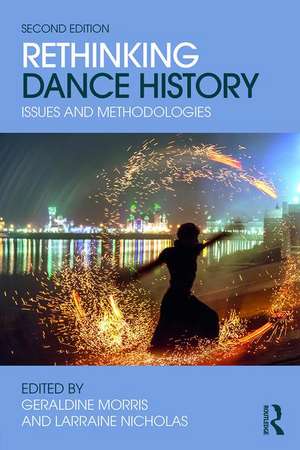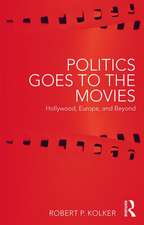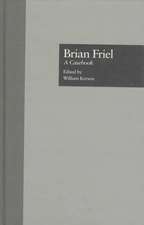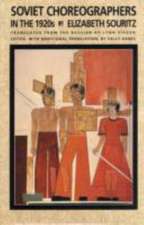Rethinking Dance History: Issues and Methodologies
Editat de Larraine Nicholas, Geraldine Morrisen Limba Engleză Paperback – 21 iun 2017
• Why Dance History? – the ideas, issues and key conversations that underpin any study of the history of theatrical dance.
• Researching and Writing – discussions of the methodologies and approaches behind any successful research in this area.
Everyone involved with dance creates and carries with them a history, and this volume explores the ways in which these histories might be used in performance-making – from memories which establish identity to re-invention or preservation through shared and personal heritages. Considering the potential significance of studying dance history for scholars, philosophers, choreographers, dancers and students alike, Rethinking Dance History is an essential starting point for anyone intrigued by the rich history and many directions of dance.
| Toate formatele și edițiile | Preț | Express |
|---|---|---|
| Paperback (1) | 342.41 lei 6-8 săpt. | |
| Taylor & Francis – 21 iun 2017 | 342.41 lei 6-8 săpt. | |
| Hardback (1) | 847.73 lei 6-8 săpt. | |
| Taylor & Francis – 21 iun 2017 | 847.73 lei 6-8 săpt. |
Preț: 342.41 lei
Nou
Puncte Express: 514
Preț estimativ în valută:
65.53€ • 68.44$ • 54.33£
65.53€ • 68.44$ • 54.33£
Carte tipărită la comandă
Livrare economică 11-25 februarie 25
Preluare comenzi: 021 569.72.76
Specificații
ISBN-13: 9781138682917
ISBN-10: 1138682918
Pagini: 272
Dimensiuni: 156 x 234 x 22 mm
Greutate: 0.42 kg
Ediția:2nd edition
Editura: Taylor & Francis
Colecția Routledge
Locul publicării:Oxford, United Kingdom
ISBN-10: 1138682918
Pagini: 272
Dimensiuni: 156 x 234 x 22 mm
Greutate: 0.42 kg
Ediția:2nd edition
Editura: Taylor & Francis
Colecția Routledge
Locul publicării:Oxford, United Kingdom
Public țintă
Postgraduate, Undergraduate, and Undergraduate AdvancedCuprins
Part One
INTRODUCTION: WHY DANCE HISTORY?
Geraldine Morris and Larraine Nicholas
- MEMORY, HISTORY AND THE SENSORY BODY: DANCE, TIME, IDENTITYLarraine Nicholas
- CARA TRANDERS'S REVERIESBy herself
- BEYOND FIXITY: AKRAM KHAN ON THE POLITICS OF DANCING HERITAGESRoyona Mitra
- AFRICAN-AMERICAN DANCE REVISITED: UNDOING MASTER NARRATIVES IN THE STUDYING AND TEACHING OF DANCE HISTORYTakiyah Nur Amin
- DANCE WORKS, CONCEPTS AND HISTORIOGRAPHYAnna Pakes
- RECONSTRUCTION AND DANCE AS EMBODIED TEXTUAL PRACTICEHelen Thomas
- PRESERVING THE REPERTORY AND EXTENDING THE HERITAGE OF MERCE CUNNINGHAMKaren Eliot
- MAKING DANCE HISTORY LIVE — PERFORMING THE PAST
Part Two
INTRODUCTION: RESEARCHING AND WRITING
Geraldine Morris and Larraine Nicholas
- DESTABILISING THE DISCIPLINE: CRITICAL DEBATES ABOUT HISTORY AND THEIR IMPACT ON THE STUDY OF DANCEAlexandra Carter
- DECOLONISING DANCE HISTORYPrarthana Purkayastha
- MANY SOURCES, MANY VOICESLena Hammergren
- ‘DREAM NO SMALL DREAMS!’: IMPOSSIBLE IMAGINARIES IN DANCE COMMUNITY ARCHIVING IN A DIGITAL AGEAstrid von Rosen
- WHEN PLACE MATTERS: PROVINCIALIZING THE ‘GLOBAL’Emily E. Wilcox
- CONSIDERING CAUSATION AND CONDITIONS OF POSSIBILITY: PRACTITIONERS AND PATRONS OF NEW DANCE IN PROGRESSIVE-ERA AMERICALinda J. Tomko
- ‘DANCIN' IN THE STREET’: STREET DANCING ON FILM AND VIDEO FROM FRED ASTAIRE TO MICHAEL JACKSONBeth Genné
- JUDSON: REDUX AND REMIXMarcia B. Siegel
- RUTH PAGE, FEMININE SUBJECTIVITY, AND GENERIC SUBVERSIONJoellen A. Meglin
- EXTENSIONS: ALONZO KING AND BALLET’S LINESJill Nunes Jensen
- GISELLE AND THE GOTHIC: CONTESTING THE ROMANTIC IDEALISATION OF THE WOMAN
Descriere
The need to discuss, question and rethink dance history has not diminished in the decade since Rethinking Dance History first published. Everyone involved with dance creates and carries with them a history, and this book explores the ways in which these histories can be used in making dance - from memories that establish identity and form resonances, to re-invention or preservation through shared and personal heritages. It also opens up the ways in which knowledge and understanding of dance history can be important for scholars, philosophers, choreographers, dancers and students. This is an essential starting point for anyone trying to analyse, explain or think about the history and directions of dance.





















